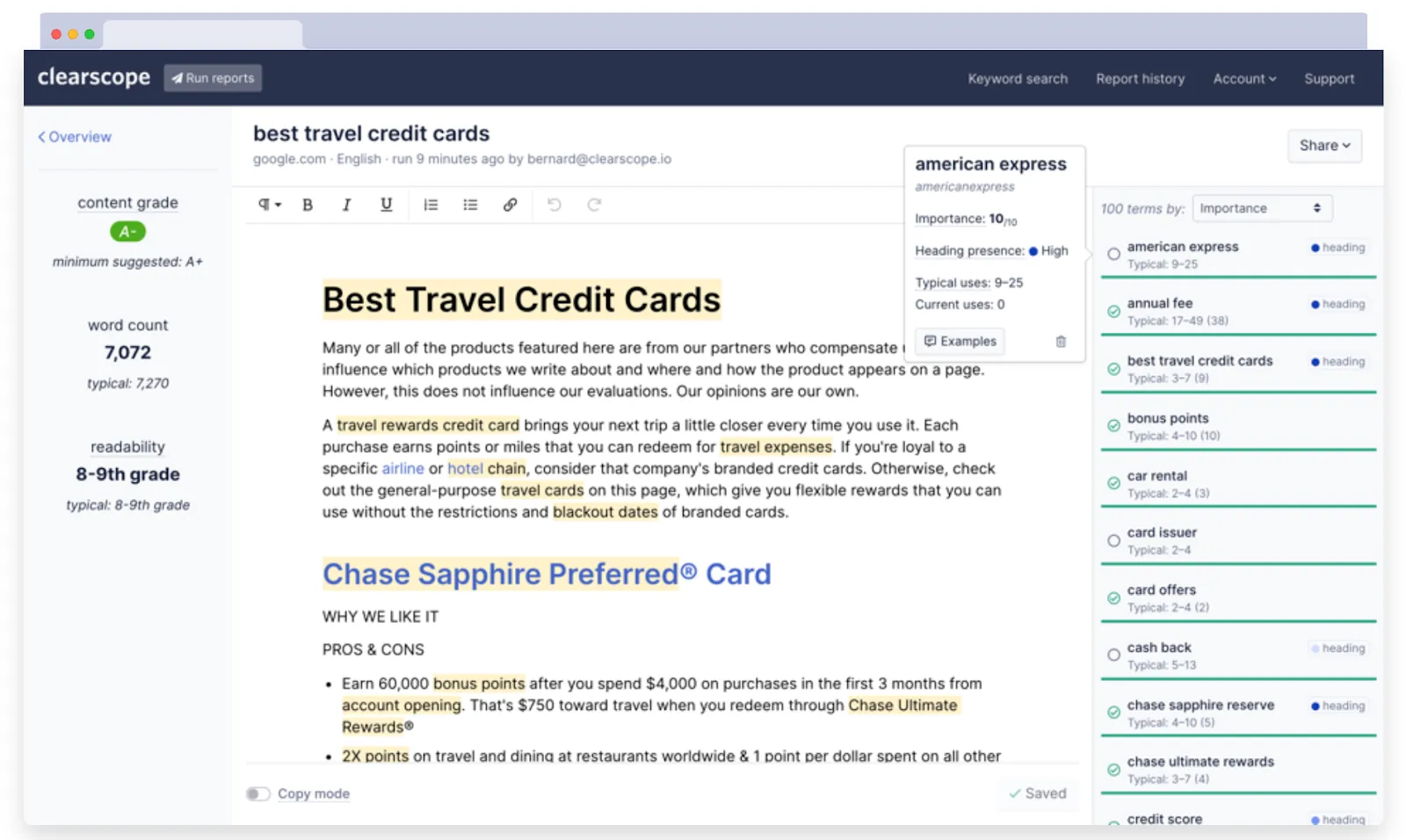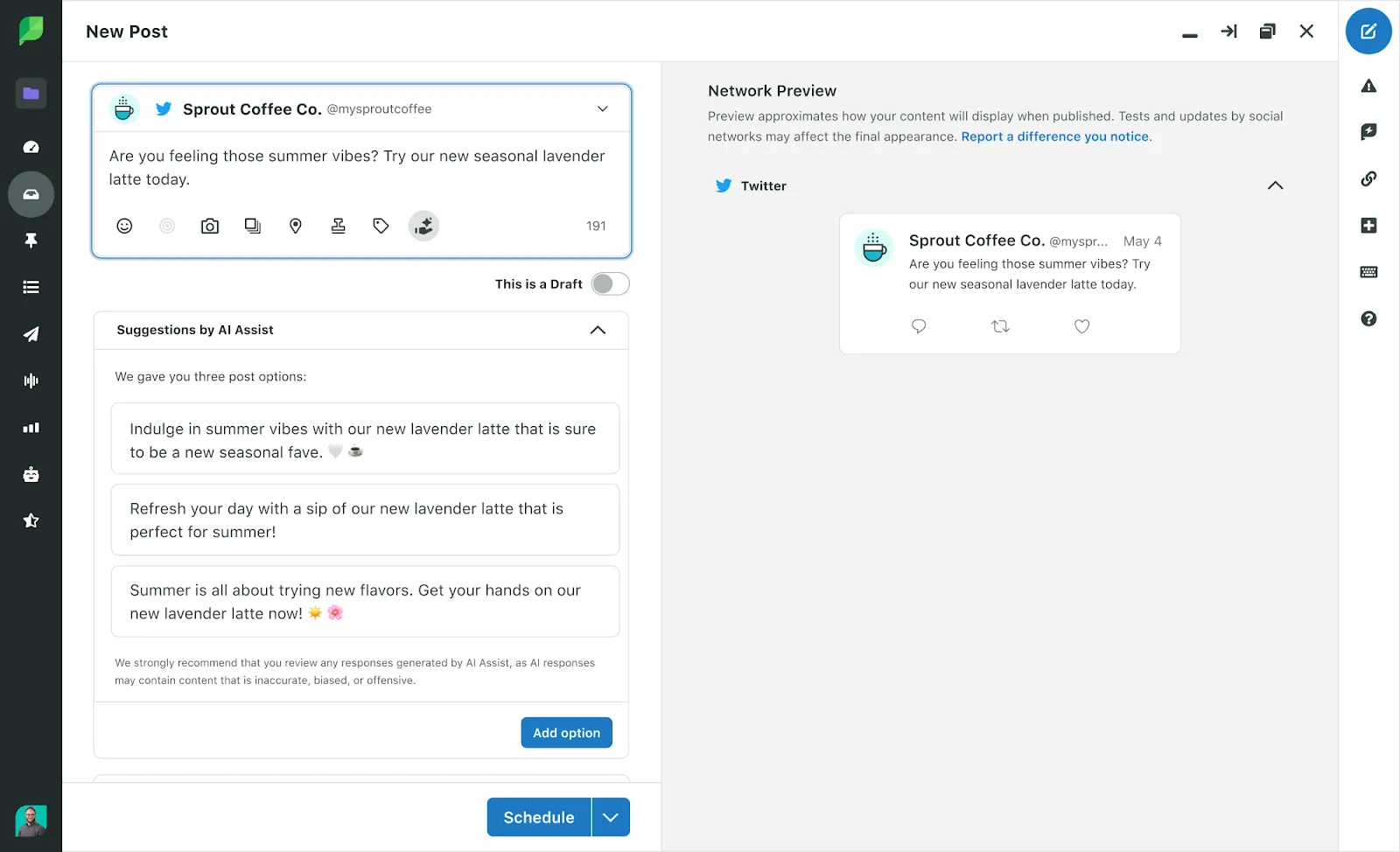You've probably heard about AI's transformative potential across industries and functions. But marketing departments will be the first affected by AI – so as a marketer, you should be the first to adopt it. In this guide, we'll dive into some real-world AI in marketing examples to show you what's possible and how you can leverage these tools to amp up your strategy.
How AI is Revolutionizing Marketing
What is AI in Marketing?
Artificial intelligence (AI) in marketing involves the use of algorithms and machine learning to analyze data and make decisions, which helps to streamline and improve various marketing tasks. Imagine software that can understand consumer behavior, predict trends, automate interactions, personalize content, and optimize ad placements—these are just some of the applications that we’ll dive into below.
Key terms you’ll hear on AI in marketing:
- Machine Learning: Using algorithms to help AI process data and learn over time, so they can make smarter and smarter decisions about marketing decisions, campaigns, etc.
- Natural Language Processing (NLP): Understanding and generating human language, for use in things like blog posts, case studies, marketing collateral, and more.
- Predictive Analytics: Forecasting future consumer behaviors (such as site visits, purchase, etc.) based on past data
Benefits of Using AI for Marketing
The benefits of using AI for marketing are substantial. First and foremost, efficiency is a major advantage. By automating repetitive tasks like data analysis and customer segmentation, AI frees up your time for creative and strategic work. Moreover, AI-driven marketing efforts often yield better accuracy and lower costs. The data-driven insights provided by AI can help you target your audience more effectively, reducing wasted ad spend.
Why you should consider AI in marketing:
- Increased Efficiency: Automates repetitive tasks.
- Better Targeting: More precise audience segmentation.
- Cost Reduction: Optimizes spend by focusing on high-yield activities.
Pro-Tip: Use AI tools to automate A/B testing for your campaigns, identifying the most effective approaches with minimal manual effort.
By integrating AI into your marketing strategy, you not only save time and resources but also gain access to deeper insights that can drive more effective campaigns. Don't just watch from the sidelines; now is the perfect time to start incorporating these AI in marketing examples into your own work.
Top AI Tools in Marketing
AI for Content Creation
AI won’t replace content marketers in the short term, but it can save you a lot of time in the content creation process and free you up to do more interesting work. Content generation tools like Jarvis and Copy.ai use advanced algorithms to generate engaging content quickly. You can use these tools to create blog posts, set up social media captions, and even fine-tune ad copy. They leverage AI to produce grammatically accurate, readable content that only needs a quick edit from you, making your marketing efforts more efficient.

For better engagement, AI tools can also help with content planning. Platforms like BuzzSumo and HubSpot provide insights on trending topics, so you know what to write to engage your audience. They analyze data from various sources and suggest topics that will likely resonate with your target audience, enhancing your content marketing strategy.
Pro-tip: Use AI tools to draft your initial content and then add a human touch by editing for voice and tone.
AI for Customer Insights
Understanding your customers better is crucial for successful marketing. Tools like Google Analytics and HubSpot leverage AI to provide in-depth customer insights. These platforms analyze user data, behavior, and engagement, giving you a comprehensive view of your audience. You can understand who your customers are, what they like, and how they interact with your content.

AI also helps with predictive analytics. Tools like Salesforce Einstein and Adaptive Insights predict future customer behavior based on past data. This allows you to anticipate needs and tailor your marketing strategies accordingly. By doing so, you can target your audience more effectively and increase conversion rates.
Pro-tip: Use customer insights to segment your audience and deliver personalized marketing messages.
AI for Email Personalization
AI takes email campaigns to the next level by ensuring that they are highly personalized and relevant. Platforms like Mailchimp and SendGrid use AI algorithms to analyze customer data, enabling you to tailor your emails to individual preferences. This could mean sending personalized product recommendations, or customizing subject lines based on what a person has opened in the past.

AI also optimizes your email scheduling. Tools like Boomerang and Yesware analyze the best times to send emails, ensuring higher open and click-through rates. By using these insights, you can reach your audience when they are most likely to engage with your content.
Pro-tip: Experiment with AI-driven A/B testing to find the perfect balance between personalized content and timing.
AI for SEO Optimization
Search engine optimization is crucial for online visibility, and AI can help simplify the process. Tools like Moz Pro and SEMrush offer AI-driven SEO analysis. They provide keyword suggestions, backlink opportunities, and content recommendations based on current search trends. Using these insights, you can improve your website's ranking on search engines.

AI can also aid in content optimization. Tools like Clearscope and SurferSEO analyze top-performing content for specific keywords and suggest improvements. They help you optimize your content for readability and relevance, making it more likely to rank higher.
Pro-tip: Use AI tools to continuously monitor your SEO performance and adjust your strategies accordingly.
AI for Social Media Management
Managing multiple social media accounts can be overwhelming, but AI tools make it easier. Platforms like Hootsuite and Buffer use AI to schedule posts, analyze engagement, and manage interactions. They help you maintain a consistent posting schedule and engage with your audience effectively.

AI also enables social listening. Tools like Brandwatch and Sprout Social monitor mentions, hashtags, and trends across social media. They provide valuable insights into what your audience is talking about, allowing you to tailor your content and messaging accordingly.
Pro-tip: Use AI tools to automate your social media posting and spend more time engaging with your audience.
In this article, we've explored various AI in marketing examples, focusing on content creation, customer insights, email personalization, SEO optimization, and social media management. By leveraging these tools, you can enhance your marketing strategies, improving customer engagement and driving more conversions. Integrate AI into your marketing efforts and stay ahead of the competition.










